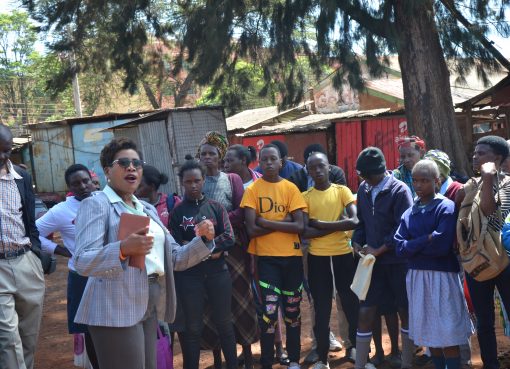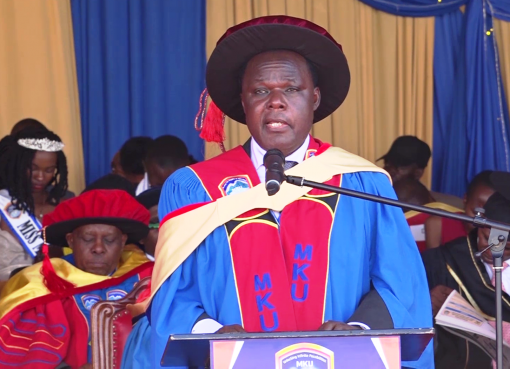The taskforce on Power of Mercy has made a raft of recommendations to streamline its operationalization and safeguard the welfare of persons released from prison following presidential pardon.
Stephen Kibunja Gitau, a joint Secretary to the taskforce said that a recommendation was made to have a review of the Power of Mercy Act 2011 in order to fully operationalize the provisions of Article 133 of the Constitution of Kenya.
The taskforce was appointed by the Attorney General through gazette notice on September 25, 2020.
Speaking at Talent Academy in Embu, Gitau noted that when the taskforce presented its report to the Attorney General on December 13, 2021 after collecting general views from Kenyans on the Power of Mercy from 24 counties, a recommendation was made on the need to have a policy framework.
The Committee was in Embu to engage residents in a consultative forum as it sought to collect views across 26 counties in Kenya to validate the first draft before formulating an all-inclusive policy. Gitau said the sought to validate the two documents, the policy draft and the bill.
He said that Embu County was the twenty second county and that the taskforce aimed to reach out to four more counties for validation of the two documents before a culmination of the exercise which would have the taskforce hold a National Stakeholders Conference on the same.
“People who have benefitted from a presidential pardon have not been able to secure gainful employment because when they seek certificate of clearance, the DCI indicates that they have a criminal record locking them out of gainful employment,” Gitau noted.
He said the taskforce also recommends that somebody who has reformed and has benefitted from a presidential pardon, if it’s a free pardon, then a criminal record has been patched and if it’s a conditional pardon the criminal record is sealed.
Further, the taskforce recommended transparency and accountability in the pardon process by incorporating the use of an electronic petition management information system such that any Kenyan could apply for Power of Mercy online.
Gitau said that by using the electronic petition management information system, one could be able to apply for the Power of Mercy online and see if it’s granted or not and also to be notified why the application was declined, making the whole process transparent and accountable.
“There are so many people in prison who have transformed and they need not to complete their sentence while in prison but they can be released to serve their sentence while at home but under a close supervision,” he said.
He said that the taskforce has recommended the establishment of the National Parole Board (NPB) that would oversee the process and mechanisms of releasing those people in prison who have transformed in order for them to serve their sentence while at home.
He further said that the taskforce has also recommended that a special consideration be put in place for vulnerable groups like the old, those who have terminal illness and pregnant women for them to be considered when it comes to the power of mercy.
Gitau also added that the taskforce recommended that foreigners who are held in Kenyan prisons be considered for mercy and if they are considered, they be repatriated to their countries of origin.
The secretary to the joint taskforce added that the taskforce recommended for the establishment of Mental Health Review Board (MHRB).
He said that people who are found to committing murder when they are mentally unstable have always been held indeterminate in Kenyan prisons but the taskforce recommends that such persons need not to be held indeterminate but the Mental Health Review Board to always be in charge of their medical reviewing before they can be released.
He added that the taskforce has also recommended a multi-sector rehabilitation and integration programme, including halfway houses where any person released from prison would be held in special rehabilitation houses.
“Even before one can be taken to these special rehabilitation integration programmes, the taskforce recommends having a reconciliation which helps to prepare the ground by involving the individual’s area chief, assistant chief, family members, church leaders and ‘nyumba kumi leaders,” said Gitau.
He added that the reconciliation chain programme is vital as it would help to avoid any stigmatization the person might face after being released from prison back to the community.
Gitau said that Kenyans who might want to access the two documents could find them on the Power of Mercy website.
The validation of the two documents is expected to end on September 29 followed by a National Stakeholder Conference on the Power of Mercy and the final bill together with the policy to be forwarded to the Cabinet before it finds its way to the Parliament.
The consultative forum on the Power of Mercy held at Talent academy Embu brought together various stakeholders including, the Judiciary, National Police Service, Civil Societies, Prison Departments, Probation Officers, Youths, Religious Leaders as well as National Government Administration Officers (NGAO)
By Justus Anzaya





